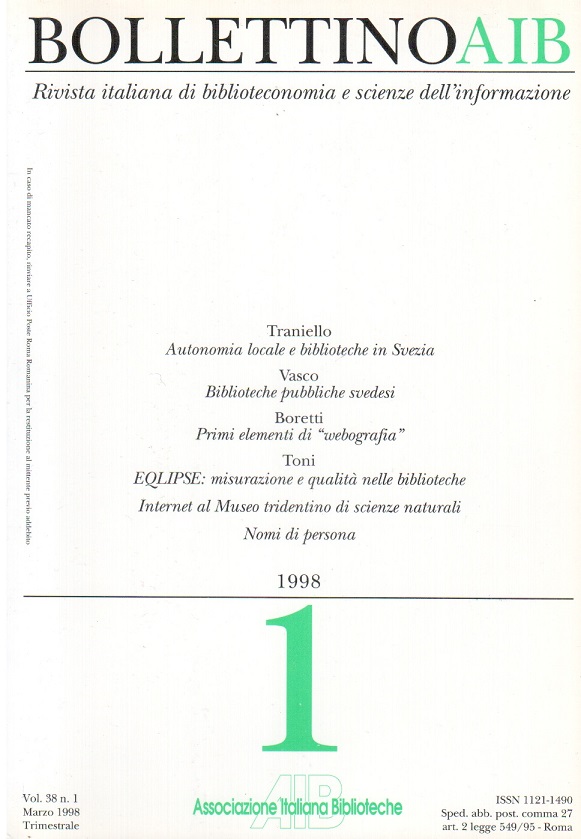EQLIPSE: un progetto europeo per la misurazione delle prestazioni e la gestione della qualità nelle biblioteche
Contenuto principale dell'articolo
Abstract
The overall objective of EQLIPSE, a European Commission funded research and development project, was to specify, develop and validate an open IT-based system to support quality management and performance measurement in libraries of all types. The system is based on a client/server architecture and offers compatibility with library systems from various library suppliers.
The project has operated through a series of six phases, as follows:
1) Library requirements analysis, in which a series of tasks have been brought together expertise from the 10 partners and associates with internationally recognised quality management, library performance measurement and technological perspectives to define the libraries requirements from EQLIPSE and hence the groundwork for development;
2) Initial functional specification, in which the technical issues, including networking and systems integration, have been reviewed, leading to the production of an initial functional specification;
3) Prototype system, in which the initial functional specification has been used to design and build a prototype, functional system;
4) Data tools and data collection, in which the partners have adapted and designed tools for collecting data, supplementary to that contained in their operational IT-based systems, and built up a test dataset for use with the system;
5) Field trials and evaluation, in which the prototype system was installed in two libraries, debugged and developed into a fully functional system;
6) Integration in libraries, in which the debugged system was fully trialled, in a pseudo operational environment, in six libraries representing the different types, and evaluated.
The project has involved ten partners, co-ordinated by the University of Central Lancashire (UK): Dynix Ltd, the Microelectronics Applications Centre, Dublin City University (Ireland), University of Münster, Stadtbüchereien Düsseldorf (Germany), Copenhagen Business School Library (Denmark), Biblioteca Nazionale Centrale of Rome (Italy), Stockholm University Library (Sweden), University of the Aegean (Greece).
The final result was the implementation of two different modules, one for quality management (Quality Workbench), and one for performance measurement (Performance Workbench).
The first module (QW), consisting of 7 functions - System Manager, Document Control, Personnel, Customer, Customer Complaints, Nonconformities, Audits - is a support for quality management positions in libraries and allows both documents circulation and procedures control. This software was specifically designed to facilitate strict adherence to the ISO 9000 quality standard and for this reason non ISO 9000 compliant environments may find its functionalities restrictive or unsatisfactory.
The second package (PW) was developed starting from the analysis of the principal sources on performance indicators, first af all the ISO 11620 standard, integrated with data selected from other seminal works on the subject. The result of this process was a list of 52 indicators (but it is an open list, with chance of increasing by the user) and a second list of datasets necessary to calculate the indicators. The module allows both data download from libraries automated systems and manual data entry.
The project, started in February 1995, was concluded in March 1997.
Dettagli dell'articolo

Questo lavoro è fornito con la licenza Creative Commons Attribuzione - Condividi allo stesso modo 4.0.
